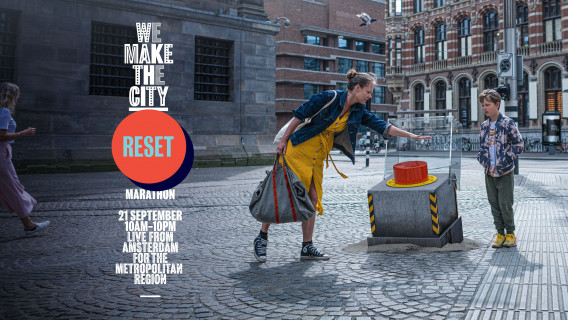After two successful editions, the WeMakeThe.City festival is heading for 2025 as a biennale: the 750th anniversary of Amsterdam. This year the uncertain future of our city and metropolitan region was discussed in a 12-hour livecast marathon on the 21st of September. The WeMakeThe.City theme ‘Reset’ brings together genius thinking, imagination and creativity to formulate alternative perspectives for action. How are we going to do things differently in the coming years? How do we work together to make our metropolis fairer, more inclusive, more sustainable, more climate-resilient, safer, more successful and happier? After all, together we make the city of, for and by everyone!
During last spring's lockdown, it became even clearer how much we depend on the digital world. We meet, chat and date in front of the screen. A solution to combat the spread of Covid-19 is also being sought in the digital domain. These developments have raised the privacy issue again: how can people's data rights be protected? Such as anonymity, transparency and control over data. Time for a good conversation about values and the importance of digital civil rights.
The session kicks off with Marleen Stikker, director of Waag and Ger Baron, Chief Technology Officer of the City of Amsterdam. Marleen explains what our digital human rights are. ‘These are the same rights just as in the analogue world. Where there is relatively much attention for analogue human rights, our civil rights in the digital domain have run wild, too little attention has been paid to this. Let's reclaim those rights! It is for example about the right to be forgotten, the right to be anonymous, but most important to me is digital sovereignty. Everyone should have the possibility to have insights in their own actions online.’
Ger agrees with Marleen. According to him, governments, and cities as well, collects too many data about residents and the public space without even knowing what they want to do with these data.’ The reason to collect them should be to learn something specific that you can improve or help people. Helping people with the collection of data also brings in new dilemmas. The city used to have a collaboration with energy providers for example. Once someone didn’t pay for the energy service, they sent out a message to the city administration. The City could then prevent someone get evicted from his/her home.
This example is not enough reason for Marleen to collect the data: ‘To me, this sounds as if we didn’t invest in our society. We could have helped these people as well if they had adequate supervision or guidance. In last years, we invested heavily in the digital domain and we made budget cuts on home care, debt counselling and community police officers. Digital solutions are not always the best solutions! Especially not when all kinds of companies have data without people knowing about this.’ Ger: ‘To a certain point I agree with this point. Digital rights also include rights to know about the data that is collected, why this is and what you can do about this. This is currenty not transparant at all, even though the City of Amsterdam is becoming more and more about about his.
Marleen: ‘I see the City of Amsterdam going in the right direction, by starting for example the Coalition for Digital Rights. However, the steps in this direction go really slow, especially in politics. This way, it remains unclear what rules companies dealing with personal data should obey. That’s why Marleen also calls on politicians in The Hague: guarantee digital human rights by imposing conditions on the market.’
Next up is Miram Rasch, researcher and teacher at the Amsterdam University of Applied Sciences and writer of the book ‘Friction. Ethics in times of dataism. Her book opens with a story about escaping the eyes of data collectors and algorithms. She states this is only possible at home. And even there, it becomes harder. ‘We have smart meters, smartphones, smart tvs. It is not clear why these devices need to collect data, with whom they share them. We don’t know now, but especially we don’t know in the future. Everybody has something to hide, because we don’t know yet what we should hide. Of course you have to inform yourself about the conditions you’re accepting. However, this is not easy at all. Try to read the Terms and Conditions of the services you use, the texts are too long and complicated. Unfortunately it can take a long before something changes. The few individuals who are conscious about the digital world, won’t change it. We need rules and regulations! But we know from the past, that maybe something heavy has to happen before people open their eyes.’
Jim Boevink, advisor Taskforce Digital Safety at the City of Amsterdam, starts an intermezzo about the right to be anonymous. Marleen Stikker: ‘People who want to abuse others, are free to hide themselves. This is because platforms are not responsible for the content their users post. They earn money with these users, they are their business models. But they they are not responsible for things happening on their platform. This is the first thing that has to change. The legal system is not in order. Make them responsible for the content on their platforms.’ M****arleen: ‘And good to emphasize: someone who is critical about the digital domain and the internet, is not necessarily against the digital world. We only have to make the internet safe and reliable!’
Want to watch the livecast (in Dutch) yourself? Check <https://dezwijger.nl/programma/reset-digital-rights>.





